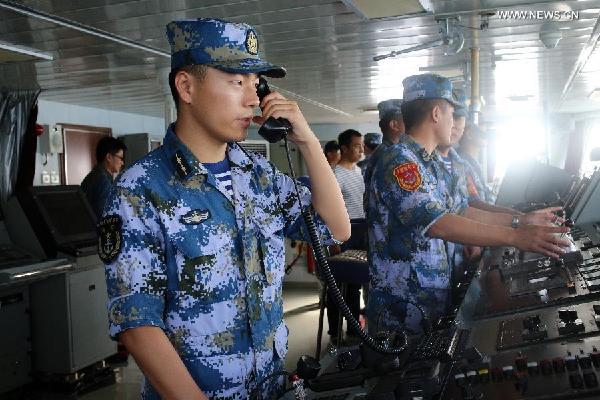Transparency in military capability and strategic intent
- By Fan Jishe
 0 Comment(s)
0 Comment(s) Print
Print E-mail China.org.cn, May 29, 2015
E-mail China.org.cn, May 29, 2015
|
|
|
Soldiers of Chinese Navy conduct communication exercise on frigate Yulin during the "Exercise Maritime Cooperation 2015", May 24, 2015. The Singapore and Chinese navies on Monday concluded the inaugural Exercise Maritime Cooperation 2015. Chinese missile frigate Yulin, Singapore's Formidable-class frigate (RSS Intrepid) and Victory-class missile corvette (RSS Valiant) participated in the bilateral maritime exercise. [Xinhua/Bao Xuelin] |
For most foreign observers and commentators, transparency is a convenient tool in the biased frame of mind of those who advocate the so-called "China threat." The discussion of transparency is not about how transparent China could be or should be, but about how China's growing military capability is viewed.
The first question to ponder is whether China is entitled to build up its military capabilities. If the answer to this question is no, China will be viewed as a threat regardless of whether it is militarily weak or strong. This is a no-brainer for China. Without a doubt, China is entitled to build up its military capabilities, as any country may do. If the answer to this question is yes, then it will not be difficult to understand China's increased military budget and growing military capability.
Over the past three decades, China has concentrated on economic development at the expense of spending on the country's military. Now China is getting rich, and increases in the military budget are simply compensations for past lack of spending rather than dramatic increases. In addition, the world has changed so much that it is time for China to upgrade its military doctrine by shifting from a ground-force-centric to a naval-and-air-force-centric defense strategy. Even so, this year's white paper emphasizes that based on China's assessment on the world security situation, the country is pursuing a national military strategy that is defensive in nature. Then why are some countries so alarmed about China's growing military capabilities?
The second question to ponder is how China's growing military might is viewed. If China's growing military capability is seen as preparation for any future confrontation, conflict or war, that is nothing to be concerned about. Every country's military must hope for the best and prepare for the worst; that is common practice, and China is no exception. However, China's growing military capability could contribute a lot to international public services, such as participating in United Nations peacekeeping missions, taking a proactive role in humanitarian rescue and disaster relief, protecting sea lanes and combating pirates on the high seas. China's actions over the past several years substantiate this constructive view. China has been called upon to take greater responsibility, and a weak Chinese military is surely a nonstarter. If other countries interact with China's military in a positive way, why bother to worry about China's growing military capabilities?
It takes two to tango, and it takes two to quarrel. How China employs its growing military capability is not determined by China only, but by both China and other countries' interactions with China. So why not applaud China's latest efforts to enhance military transparency?
The author is a columnist with China.org.cn. For more information please visit: http://91dzs.com/opinion/fanjishe.htm
Opinion articles reflect the views of their authors, not necessarily those of China.org.cn.






